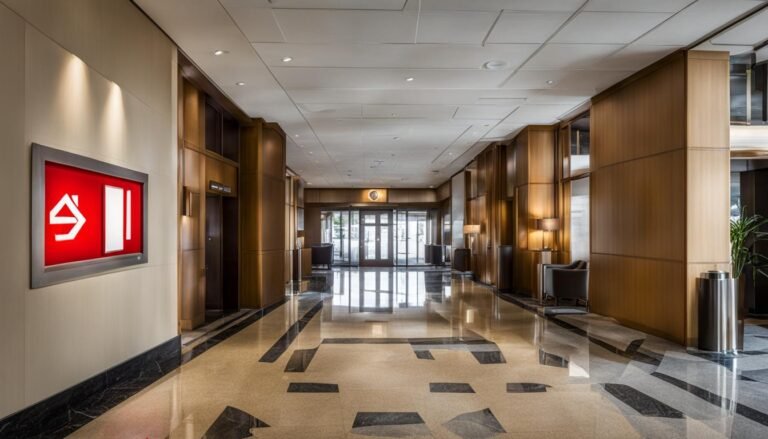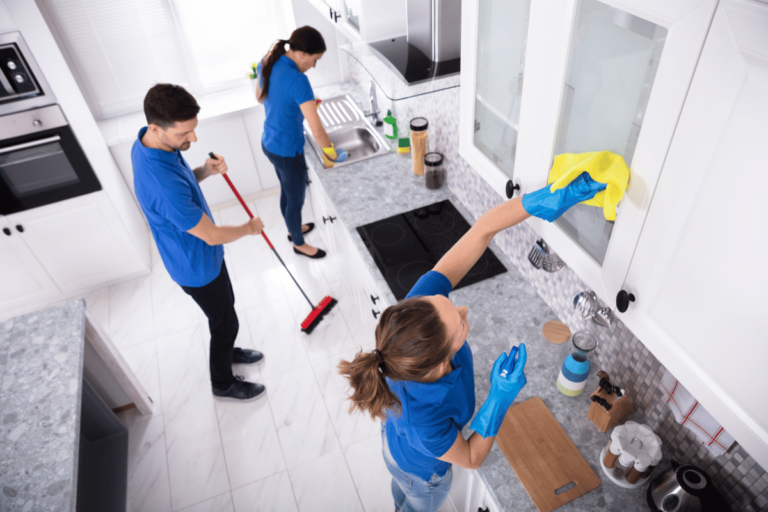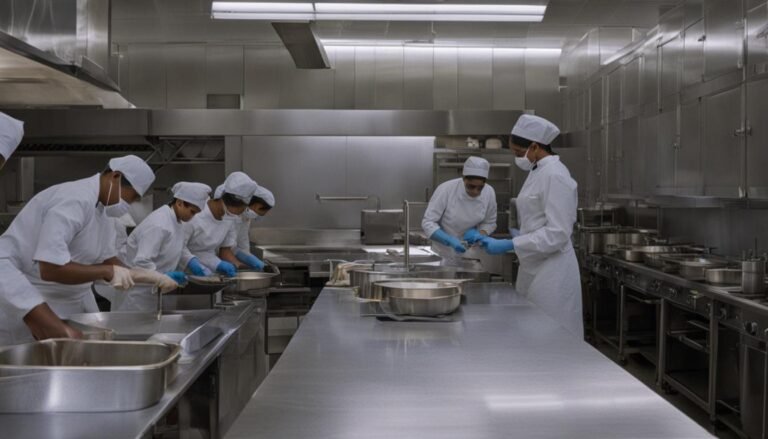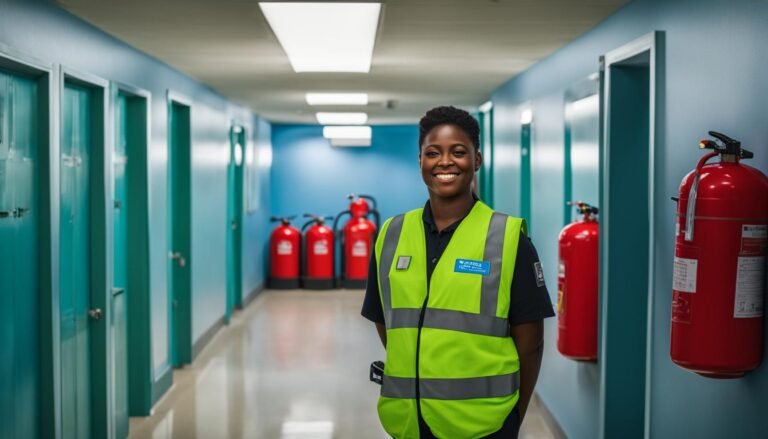Implementing Rigorous Health and Safety Protocols in Hotels
Hotels around the world are prioritizing the safety and well-being of their guests and employees by implementing rigorous health and safety protocols. With the guidance of organizations like the United Nations World Tourism Organization (UNWTO), leading hotel brands are taking proactive steps to ensure the highest standards of cleanliness and safety.
These measures, which include increased cleaning frequency, contactless check-in, and the provision of hygiene kits, aim to create a safe and secure environment for all. By adhering to these protocols, hotels instill confidence in travelers and demonstrate their commitment to their guests’ health and safety.
Key Takeaways:
- Hotels worldwide are implementing rigorous health and safety protocols to protect guests and employees.
- The UNWTO has provided guidelines for the hospitality industry, including increased cleaning, contactless check-in, and hygiene kits.
- Leading hotel brands like Marriott, Four Seasons, and Hilton have launched their own initiatives to enhance cleanliness and implement safety measures.
- These protocols are essential for creating a safe and secure environment for travelers.
- By following these guidelines, hotels promote confidence in the hospitality industry and prioritize the well-being of their guests.
UNWTO Global Guidelines for Hospitality Businesses
The United Nations World Tourism Organization (UNWTO) has provided comprehensive guidelines for hospitality businesses to ensure health and safety during the COVID-19 pandemic. These guidelines offer a roadmap for hotels to implement rigorous health and safety protocols, promoting confidence in travelers and reducing the risk of virus spread.
Key recommendations from the UNWTO include:
- Increasing the frequency of cleaning in common areas and contact surfaces to minimize the risk of contamination.
- Providing easy and updated information to guests regarding health and safety measures implemented by the hotel.
- Exploring new cleaning methods and technologies to enhance sanitation practices and ensure thorough disinfection.
- Implementing contactless check-in procedures to minimize physical contact and reduce the risk of transmission.
- Keeping spare rooms available for guests who may develop symptoms during their stay, ensuring appropriate isolation measures are in place.
The UNWTO also recommends the creation of positions such as hygiene managers to oversee and enforce these guidelines, ensuring that hotels have dedicated staff responsible for maintaining high health and safety standards.
| Health and Safety Guidelines for Hotels: |
|---|
| The UNWTO suggests increasing cleaning frequency in common areas and contact surfaces. |
| Hotels should provide easy and updated information to guests regarding health and safety measures implemented. |
| Exploration of new cleaning methods and technologies is encouraged to enhance sanitation practices. |
| Contactless check-in procedures should be implemented to minimize physical contact. |
| Hotels should keep spare rooms for sick guests to facilitate appropriate isolation measures. |
By following these guidelines, hotels can prioritize the health and safety of both guests and employees, fostering a secure environment for all. Implementing these protocols not only helps safeguard against COVID-19 but also strengthens the overall resilience of the hospitality industry.
Marriott International’s Cleanliness and Training Measures
Marriott International, one of the leading hotel brands, has implemented comprehensive cleanliness and hygiene practices to prioritize the safety and well-being of its guests. As part of its commitment to combat COVID-19, Marriott has launched the Global Cleanliness Council and partnered with esteemed organizations like the Center for Disease Control (CDC) and the World Health Organization (WHO).
To ensure the highest standards of cleanliness, Marriott has introduced new technologies such as electrostatic sprayers, which allow for the efficient disinfection of surfaces throughout the hotel. The cleaning routines have been enhanced with a specific focus on high-touch areas, guest contact points, and food safety. The Marriott mobile application has also been updated to facilitate contactless services like check-in, requests, and room service ordering, minimizing physical interactions and maximizing guest safety.
Marriott’s dedication to cleanliness extends to the training of its staff. Through collaboration with reputable health organizations, Marriott employees receive thorough training on hygiene protocols and COVID-19 prevention measures. This ensures that all staff members are equipped with the knowledge and skills necessary to uphold Marriott’s high cleanliness standards and create a safe environment for guests.
Table: Marriott’s Enhanced Cleaning Measures
| Cleaning Focus | Details |
|---|---|
| High-touch areas | Frequent disinfection of surfaces such as doorknobs, elevator buttons, and handrails |
| Guest contact points | Additional cleaning and sanitization of key cards, pens, and payment terminals |
| Food safety | Enhanced protocols for food handling, preparation, and service to ensure guest safety |
By implementing rigorous cleanliness measures and providing thorough staff training, Marriott International aims to instill confidence in guests and demonstrate its commitment to their health and safety. These comprehensive measures ensure that Marriott remains a trusted choice for travelers seeking a clean and secure hotel experience.
Four Seasons’ Lead With Care Program
As part of its commitment to ensuring the safety and well-being of guests, Four Seasons has launched the Lead With Care program. In collaboration with Johns Hopkins Medicine International, the program allows the hotel chain to access the latest developments and guidelines for combating COVID-19. This partnership ensures that Four Seasons is equipped with the necessary knowledge and expertise to implement enhanced safety measures in all their properties.
Under the Lead With Care program, Four Seasons has implemented stringent cleanliness protocols to ensure the highest level of hygiene throughout its hotels. These protocols cover various aspects, including increased frequency of cleaning and disinfection, especially in high-touch areas. The hotel chain has also introduced measures to enhance guest safety and comfort, such as providing personal protective equipment and implementing social distancing practices.
To ensure that these safety measures are effectively implemented and monitored, Four Seasons has appointed hygiene officers at each property. These officers are responsible for ensuring that all protocols are followed rigorously and that guests and staff are well-informed about the measures in place. Additionally, the Lead With Care program has multiple phases, allowing Four Seasons to continuously review and enhance its procedures based on the latest information and guidelines.
| Enhanced Safety Measures at Four Seasons |
|---|
| Increased cleaning and disinfection frequency |
| Provision of personal protective equipment |
| Social distancing practices |
| Appointment of hygiene officers at each property |
| Phased approach for continuous improvement |
The Lead With Care program is a testament to Four Seasons’ commitment to prioritizing the health and safety of their guests. By implementing these stringent measures and collaborating with medical experts, Four Seasons aims to provide a secure and comfortable environment for all visitors.
Hilton’s Hilton CleanStay Program
Hilton, one of the leading hotel chains, has introduced the Hilton CleanStay program to ensure the safety and well-being of guests during the COVID-19 pandemic. This program incorporates enhanced cleaning protocols and safety measures that align with expert recommendations from Lysol (Dettol) and the Mayo Clinic Infection Prevention and Control team. Hilton’s commitment to cleanliness and guest safety is evident in the implementation of these stringent protocols.
The Hilton CleanStay program focuses on several key areas. Firstly, Hilton has implemented new cleanliness standards, including increased cleaning frequency of public areas and the use of hospital-grade disinfectants. Guest rooms undergo thorough cleaning processes, with special attention given to high-touch surfaces. To instill confidence in guests, Hilton has introduced a room seal to indicate that guest rooms have not been accessed since cleaning.
Contactless check-in is another important aspect of the Hilton CleanStay program. The hotel chain has implemented digital check-in and check-out procedures to minimize physical contact between guests and hotel staff. This not only enhances safety but also provides a seamless and efficient experience for guests.
Hilton CleanStay Program Highlights:
- Enhanced cleaning protocols and increased cleaning frequency of public areas
- Thorough cleaning processes for guest rooms, with special attention to high-touch surfaces
- Room seal to indicate that guest rooms have not been accessed since cleaning
- Contactless check-in and check-out procedures for a seamless and safe experience
Through the Hilton CleanStay program, Hilton aims to prioritize the health and safety of guests while delivering exceptional hospitality. By implementing these rigorous protocols, Hilton sets a high standard for hotel cleanliness and contributes to the overall confidence of travelers during these challenging times.
Hyatt’s Global Care & Cleanliness Commitment
As part of its dedication to the health and safety of its guests and staff, Hyatt has implemented a comprehensive Global Care & Cleanliness Commitment. This commitment focuses on enhancing hygiene measures and implementing rigorous safety protocols throughout its hotels worldwide.
Hyatt’s commitment includes enhanced cleaning and disinfection procedures, with a specific focus on high-touch areas in guest rooms and public spaces. The frequency of cleaning in these areas has been increased to ensure a safe and hygienic environment for guests. Additionally, Hyatt has implemented guest-accessible sanitizing stations throughout its properties, allowing guests to maintain proper hand hygiene.
To further prioritize guest safety, Hyatt is evaluating the adoption of new technologies such as electrostatic sprayers and ultraviolet light for enhanced surface and object sanitization. These advanced measures ensure that all areas of the hotel are thoroughly cleaned and disinfected to minimize the risk of potential virus transmission.
With its Global Care & Cleanliness Commitment, Hyatt sets a benchmark for hotel safety protocols and hygiene measures. By implementing these rigorous measures, Hyatt aims to provide a secure and comfortable environment for guests, enabling them to enjoy their stay with peace of mind.
| Hyatt’s Global Care & Cleanliness Commitment |
|---|
| Enhanced Cleaning and Disinfection |
| – Increased cleaning frequency in high-touch areas |
| – Guest-accessible sanitizing stations throughout the hotel |
| Advanced Technologies |
| – Evaluation of electrostatic sprayers and ultraviolet light for enhanced sanitization |
In line with its commitment to guest safety, Hyatt goes above and beyond to ensure the highest standards of hygiene and cleanliness in its hotels. By implementing these measures, Hyatt strives to provide a safe and worry-free experience for all guests.
Accor’s Cleanliness & Prevention Label and Partnership with AXA
Accor, one of the leading hotel chains worldwide, has taken significant steps to prioritize cleanliness and ensure the well-being of its guests. As part of its commitment to maintaining high standards of hygiene, Accor has launched the Cleanliness & Prevention Label known as ALLSAFE. This label is a comprehensive program that encompasses various safety and hygiene measures implemented across all Accor hotels worldwide.
Accor’s ALLSAFE program includes enhanced cleaning protocols, reinforced food safety standards, and the introduction of new buffet protocols to ensure guest safety. The program also emphasizes the provision of individual sanitizers, wipes, and masks to guests, promoting personal hygiene and protection. Through the implementation of contactless check-in and reinforced cleaning protocols in public areas, Accor aims to create a safe and secure environment for both guests and staff.
In addition to the Cleanliness & Prevention Label, Accor has partnered with AXA, a renowned global insurance provider, to offer unique medical assistance in hotels. This partnership ensures that guests can receive timely and professional medical support during their stay. With AXA’s assistance, Accor reinforces its commitment to the health and well-being of its guests, providing an added layer of security and peace of mind.
The ALLSAFE Program at a Glance:
| Enhanced Cleaning Protocols | Reinforced Food Safety Standards | New Buffet Protocols |
|---|---|---|
| Increased frequency of cleaning and disinfection in all areas | Stringent guidelines for food handling and service | Introduction of individual portions and staff-assisted buffet services |
| Focus on high-touch areas and guest rooms | Implementation of advanced cleaning technologies | Restructured buffet layouts to promote social distancing |
| Use of certified disinfectants and cleaning products | Training of staff on proper food safety protocols | Regular monitoring and adjustment of buffet services |
Accor’s commitment to cleanliness and the implementation of preventive measures, combined with its partnership with AXA for medical assistance, reaffirms the brand’s dedication to providing a safe and comfortable environment for guests. By prioritizing hygiene and guest well-being, Accor sets a new standard for the hospitality industry, ensuring that travelers can enjoy their stay with confidence and peace of mind.
Other Hotel Chains’ Safety Protocols and Measures
In addition to leading hotel brands like Marriott, Four Seasons, Hilton, and Accor, numerous other hotel chains have implemented their own safety protocols and measures to ensure the health and well-being of their guests and staff. These measures aim to address the specific challenges posed by the COVID-19 pandemic and create a safe environment for everyone.
Bastion
Bastion Hotels has implemented enhanced cleaning practices and hygiene measures throughout its properties. This includes increased cleaning frequency of public areas and high-touch surfaces, as well as the provision of hand sanitizers in various locations. They have also implemented social distancing measures in shared spaces and have adjusted their food handling and service protocols to prioritize guest safety.
Best Western
Best Western has implemented a comprehensive set of safety measures under their We Care Clean program. This includes enhanced cleaning and disinfection procedures, increased availability of hand sanitizers in public areas, and social distancing measures. Best Western also offers contactless check-in and express check-out options to minimize physical contact between guests and staff.
Countrywide Hotels
Countrywide Hotels has implemented strict health and safety protocols across its properties. This includes increased cleaning and sanitization of guest rooms, public areas, and high-touch surfaces. They have also implemented social distancing measures, such as spaced seating in dining areas and limited capacity in shared facilities. Countrywide Hotels ensures that all staff receive comprehensive training on health and safety measures.
Fletcher
Fletcher Hotels has implemented various safety measures to protect the health and well-being of their guests and staff. This includes enhanced cleaning and sanitization protocols, increased availability of hand sanitizers in public areas, and social distancing measures. They have also implemented contactless check-in and check-out procedures to minimize physical contact and ensure a seamless guest experience.
| Hotel Chain | Enhanced Cleaning Practices | Hygiene Measures | Social Distancing Measures |
|---|---|---|---|
| Bastion | Increased cleaning frequency of public areas and high-touch surfaces |
Provision of hand sanitizers | Adjusted food handling and service protocols |
| Best Western | Enhanced cleaning and disinfection procedures | Increased availability of hand sanitizers | Contactless check-in and express check-out options |
| Countrywide Hotels | Increased cleaning and sanitization | Comprehensive staff training | Spaced seating in dining areas and limited capacity |
| Fletcher | Enhanced cleaning and sanitization protocols | Increased availability of hand sanitizers | Contactless check-in and check-out procedures |
The Importance of Implementing Rigorous Health and Safety Protocols
Ensuring the well-being of guests and staff is paramount in the hospitality industry, especially in the current climate. Implementing stringent health and safety protocols in hotels is crucial to create a safe and secure environment for everyone. These protocols not only protect against the risk of COVID-19 but also instill confidence in travelers, enabling them to enjoy their stay without worry.
By following guidelines provided by organizations like the UNWTO and adopting enhanced cleaning, hygiene, and safety measures, hotels can prioritize the health and safety of their guests. Increased cleaning frequency, especially in high-contact areas, along with the provision of hygiene kits and contactless check-in, significantly reduce the risk of virus transmission. Such measures signal to guests that their well-being is of utmost importance.
Furthermore, implementing rigorous health and safety protocols also benefits the reputation of hotels. Word-of-mouth recommendations and positive online reviews play a significant role in attracting new guests, especially during uncertain times. By providing a safe and sanitized environment, hotels can build trust with their clientele and establish themselves as leaders in the industry.
The Future of Health and Safety in Hotels
The COVID-19 pandemic has significantly impacted the hospitality industry, prompting hotels to rethink their health and safety protocols. As the world adapts to the evolving situation, hotels must anticipate future challenges and continue implementing rigorous measures to ensure the well-being of guests and staff.
One of the key trends that we can expect in the future is the increased use of technology to enhance safety protocols. Hotels may adopt advanced cleaning technologies such as UV-C light systems and autonomous robots to sanitize guest rooms and public areas more effectively. Contactless check-in and keyless entry systems will likely become more prevalent, minimizing physical contact and reducing the risk of transmission.
Another important aspect of future health and safety protocols in hotels is the emphasis on training and education. Hotel staff will receive comprehensive training on hygiene practices, infection control, and emergency response procedures. This will ensure that employees are equipped with the knowledge and skills necessary to maintain a safe environment and promptly respond to any potential health risks.
Furthermore, hotels will continue to collaborate with renowned health organizations and experts to stay updated on the latest guidelines and best practices. This includes partnerships with medical institutions and the adoption of comprehensive cleanliness certifications. By following these evolving safety protocols, hotels can instill confidence in guests and demonstrate their commitment to maintaining the highest standards of health and safety.
Summary:
- The future of health and safety in hotels will see increased use of technology for cleaning and sanitization.
- Contactless check-in and keyless entry systems will become more prevalent, reducing physical contact.
- Comprehensive training and education for hotel staff will ensure a safe environment and effective response to health risks.
- Hotels will continue to collaborate with health organizations and adopt certifications to demonstrate their commitment to health and safety.
Conclusion
The implementation of rigorous health and safety protocols in hotels is paramount in the wake of the COVID-19 pandemic. Leading hotel brands and global organizations like the UNWTO have provided comprehensive guidelines and recommendations for the hospitality industry to ensure the safety and well-being of guests. By diligently adhering to these protocols and continuously improving cleanliness practices, hotels can create a safe and welcoming environment for travelers.
Throughout the industry, hotel chains such as Marriott, Four Seasons, Hilton, Hyatt, and Accor have demonstrated their commitment to guest safety by introducing enhanced cleaning routines, contactless services, and the use of advanced technologies. These measures, combined with increased cleaning frequency, the provision of hygiene kits, and the implementation of contactless check-in, have significantly reduced the risk of virus spread within hotels.
Moving forward, it is evident that health and safety will remain a top priority for the hotel industry. Hotels are likely to continue implementing strict protocols, adopting new technologies, and regularly training staff to handle future challenges. By staying updated with the latest guidelines and continuously improving their safety measures, hotels can instill confidence in travelers and create a secure environment that prioritizes the well-being of guests and staff alike.







